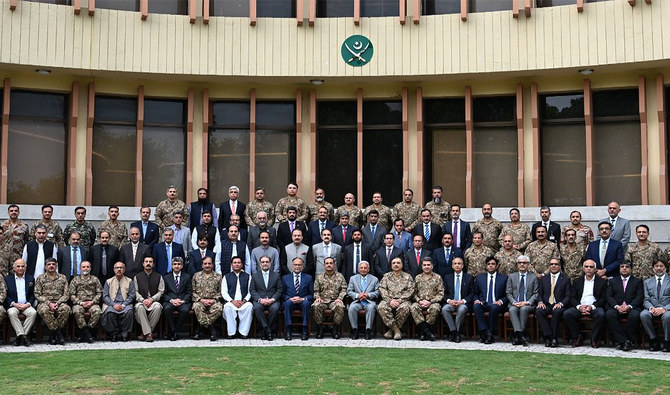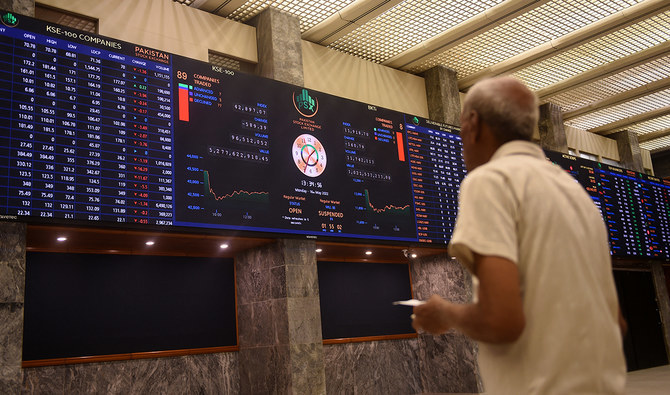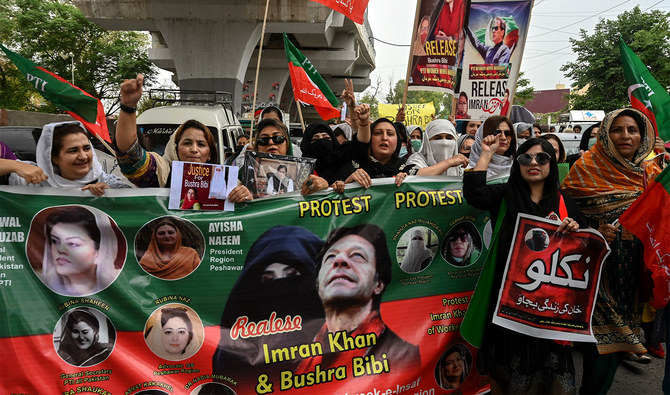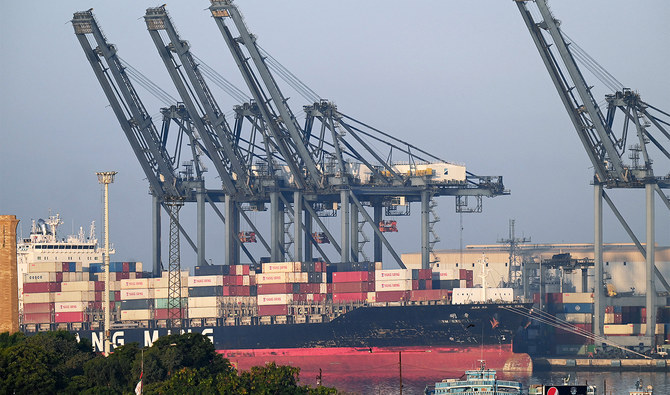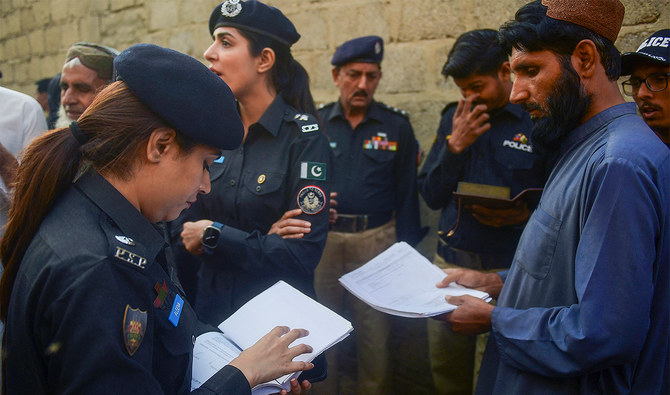ISLAMABAD: Suriya Jamal is the director-general of the cyber-wing of Pakistan’s Ministry of Information. Every day she ensures that Internet and social media monitoring reports are prepared for senior officials, Internet campaigns are designed for national events and her team provides seamless IT and communications services support to the ministry and its attached organs.
Since October 2018, however, Jamal’s job has had a new component: running the ministry of information’s @FakeNews_Buster account on Twitter that is meant to highlight articles the government considers to be ‘fake news’, including one in July by Arab News.
Each post on the @FakeNews_Buster Twitter account carries a big red label reading “FAKE NEWS” in English and a line saying: “Disseminating #FakeNews is not only unethical and illegal but it is also disservice to the nation. It is the responsibility of everyone to reject irresponsible behavior. Reject #FakeNews.”
Digital rights activists and journalists told Arab News the venture, which routinely singles out individual journalists, fits a pattern of creating alternative realities meant to sow confusion and is part of the government’s sweeping efforts to dismiss real news it does not like and intimidate journalists who write or speak critically of its policies.
Since his campaign to run for US president, Donald Trump has popularized the term ‘fake news,’ invoking it to undermine opponents, rally his supporters and discredit journalists who aggressively investigated his campaign and now his presidency.
Emboldened by Trump, many authoritarian and populist leaders around the world have seized on the phrase ‘fake news’ as a tool to attack critics.
Pakistan too has taken a shine to the concept.
#LISTEN: US President #DonaldTrump's famous infectious phrase "#FakeNews", widely used in #Pakistan haunts local media but @FariehaAziz says the phrase is incorrect & misused. @MOIB_Official @FakeNews_Buster
-
Read the inside story by @AamirSaeed_: https://t.co/kaZGC18TjF pic.twitter.com/AoaYEOlsKK— Arab News Pakistan (@arabnewspk) September 29, 2020
In July this year, the government said it was preparing new laws to curb coronavirus-related ‘fake news’ on social media platforms in a move that has stoked fears authorities might use the additional powers to choke freedom of speech and chill dissent.
It was not immediately clear what criteria the Pakistani ministry of information applies in its effort to identify what it considers to be ‘fake news,’ and Jamal declined to answer questions beyond that the @FakeNews_Buster account labeled stories as ‘fake’ after seeking information and ‘clarifications’ from relevant government departments and officials.
“We simply tell people about the government’s viewpoint,” she said. “How is this harassment?”
In a joint statement last month, a group of Pakistani women journalists demanded action by the government against social media attacks, including campaigns to accuse them of peddling ‘fake news’ for covering the government’s policies critically.
“The online attacks are instigated by government officials and then amplified by a large number of Twitter accounts, which declare their affiliation to the ruling party,” the Committee to Protect Journalists said in a petition last week.
Azhar Mashwani, an adviser on digital media to the chief minister of Punjab, Pakistan’s most populous province, denied government social media accounts were being used to harass journalists or suppress freedom of the press.
The prime minister, he said, had conveyed “clear instructions” through the ministry of information to all government departments to issue rebuttals against ‘fake news’ and take legal action. “But no department has initiated any action so far,” he told Arab News.
“We bring facts to the people,” he added.
In one of many examples where Mashwani has taken to Twitter to accuse journalists of peddling ‘fake news,’ he accused a reporter at Pakistan’s daily Dawn newspaper last month of “twisting and altering” his remarks in a WhatsApp interview for a story about the ruling Pakistan Tehreek-i-Insaf party’s use of social media to project a ‘positive’ image of Pakistan.
The reporter published a complete transcript of the conversation, showing that she had quoted Mashwani verbatim. But he continued to post on Twitter saying what was published was a “total misrepresentation.”
I am considering my options, including defamation case, against @dawn_com for twisting and altering my statements, and publishing out of context, which is against the basic Journalistic ethics/practices
Pic1 & 3: Out of context & altered statements
Pic 2 &4: My actual statements pic.twitter.com/Jg4fpxvlV6— Azhar Mashwani (@MashwaniAzhar) August 16, 2020
In an article last week, the website for Pakistan’s Geo News channel fact-checked a number of news stories that the @FakeNews_Buster account and government representatives had labeled as ‘fake’ on social media, including an Arab News report published on July 7 about the centuries-old Ram Mandir temple in Islamabad where Hindus are no longer allowed to pray.
Disseminating #FakeNews is not only unethical and illegal but it is also disservice to the nation. It is the responsibility of everyone to reject irresponsible behavior. Reject #FakeNews. pic.twitter.com/921QCiWPhT
— FakeNewsBusterMoIB (@FakeNews_Buster) July 12, 2020
In response to the post by @FakeNews_Buster, Arab News sent a letter to information minister Shibli Faraz, urging the ministry to take down the tweet and explaining the multiple rounds of fact-checking and editing that the story had gone through.
The ministry acknowledged receiving the letter, but had not taken action to remove the post, Baker Atyani, Asia bureau chief for Arab News, said.
“The story was thoroughly investigated, checked, and cross-checked by senior editors of Arab News but unfortunately we didn’t hear back from the ministry or the information minister,” he said. “We have asked in our letter that the tweet should be taken down and the ministry should clarify that the Arab News story was accurate.”
Atyani said Arab News had urged the ministry to take up such concerns with the organization directly, rather than targeting its reporters and editors on social media.
“We believe these kinds of unfortunate claims not only undermine our credibility,” he said, “but also could put the lives of our team who worked on the story at risk.”
When Arab News asked Jamal about the @FakeNews_Buster tweet about its story, she declined comment, saying “Let me check.”
“Whenever I rebut a story, I do it with facts, and this is not harassment of journalists,” Dr. Arsalan Khalid, the prime minister’s focal person on digital media, told Arab News when asked about attacks on journalists by government-affiliated social media accounts. “Ideally when you label a news as fake news, you will have to provide the details through documents or videos and nobody should get offended over it. If it is fake news, it is fake news.”
Farieha Azizi, a digital rights activist who heads Bolo Bhi, said the government used accounts like @FakeNews_Buster to beat back media scrutiny and browbeat reporters, and the strategy to attack individuals, rather than organizations, on social media was a deliberate one.
“I’m not saying that you should start targeting the organizations, but the institutions have a mechanism and people to respond,” she said. “But here you’re singling out individuals deliberately, then multiple accounts start targeting them and give threats only because there was a difference of opinion, or an opinion which they [government and its supporters] don’t like.”
“If the government wants to clarify a news item, it should do it from official sources only,” Aziz added, saying the Pakistan government had picked up the term ‘fake news’ from Trump who routinely used it to discredit journalists and play down stories against him.
Shahzada Zulfiqar, president of the Pakistan Federal Union of Journalists [PFUJ], said the government was “intentionally” using social media platforms to confuse the public and discredit journalists it did not agree with.
He said government representatives used social media to “incite the public, their [government’s] supporters and followers” to attack and abuse journalists by using ‘fake news’ as a tool.
“This is certainly a condemnable act,” Zulfiqar said, “and the government must ensure freedom of press in the country instead of working against it.”
Imran Ghazali, the head of the newly established Digital Media Wing, said he was working to get all official accounts verified so no one could claim to speak in the government’s name and an ‘authentic and data-driven’ flow of information could be maintained on social media.
“Once it is done,” he said, “many of the issues will stand resolved automatically.”




